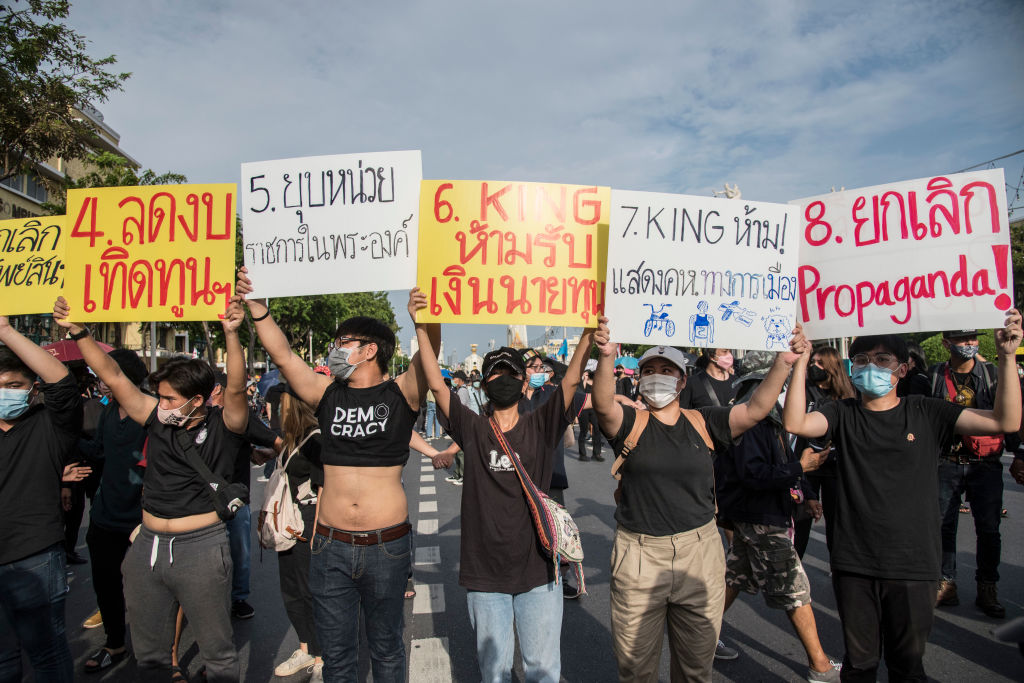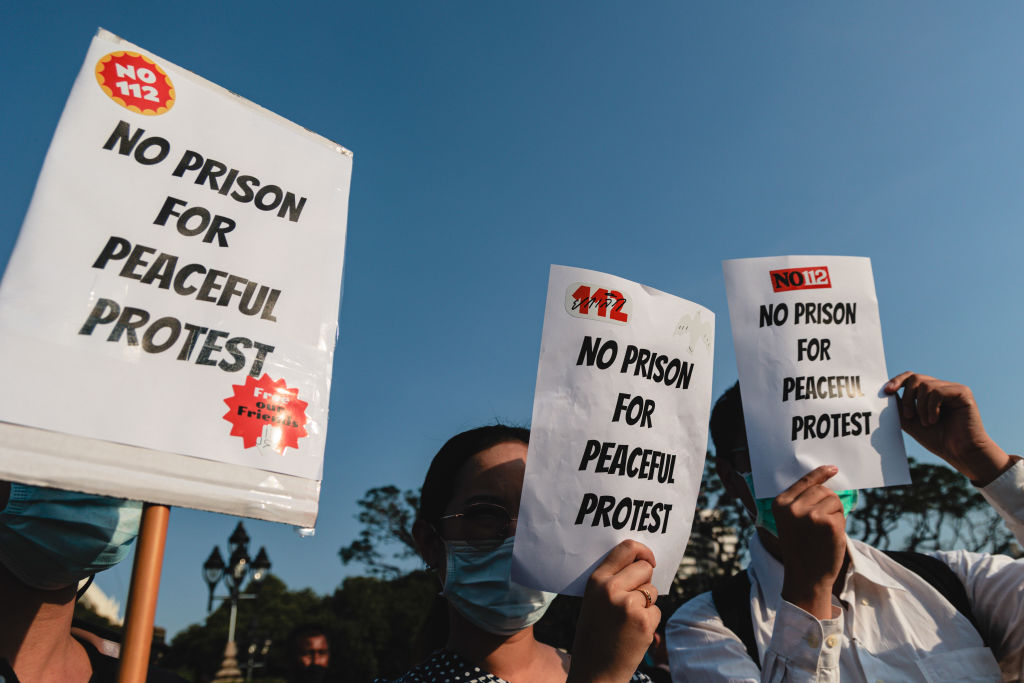
A 19-year-old pro-democracy activist in Bangkok was sentenced on Thursday to one year in jail for wearing a crop top in 2020—or rather, for poking fun at Thailand’s eminently mockworthy yet notoriously unmockable King Maha Vajiralongkorn, in part by wearing a crop top.
The teenager, identified by the pseudonym Sainam, is one of at least 253 people, including minors as young as 15, who have been charged in the last three years with violating Section 112 of the country’s criminal code, which punishes criticisms of the monarchy with up to 15 years behind bars and which, rights groups say, has been systematically used to quell political dissent.
“Sainam’s case,” Akarachai Chaimaneekarakate—an advocacy associate at Thai Lawyers for Human Rights, which tracks and assists those facing political persecution—tells TIME, “is yet another piece of evidence that points towards the shrinking of civic space in Thailand.”
The latest sentencing also comes as hopes for an end to the sweeping royal defamation prosecutions are quickly fading.
Thailand’s royal family has faced increasing public criticism in recent years, most notably in the form of pro-democracy protests that rocked the country in 2020 and 2021. While initially aimed at the military-aligned government—which seized power in 2014 and maintained its rule through a multi-party coalition—demonstrations soon expanded in scope to also take aim at the country’s long untouchable monarchy.
Read More: Why Are Thai Protesters Risking Up to 15 Years in Prison to Criticize the Monarchy?
Building off the momentum of this movement, the progressive Move Forward Party, led by Pita Limjaroenrat, emerged as the biggest winner of Thailand’s general election in May, after the party promised to reform the country’s military-backed and pro-monarchy political institutions—including amending the controversial lèse-majesté law.

But Pita’s bid to become Prime Minister was thwarted by Thailand’s conservative political establishment. Last week, his nomination for the top job fell short of the necessary support from the country’s junta-appointed Senate, and he was blocked this week from being renominated. Meanwhile, the Constitutional Court suspended Pita from parliament on Wednesday amid allegations of violating election laws.
Move Forward announced on Friday that it will step back to let coalition ally Pheu Thai, a party that also opposes the incumbent military-backed rule but does not support amending Section 112, take the lead in forming the next government.
“Pita’s defeat ensures that [Section] 112 will be a part of Thai law for at least the next few years, or until an election where a pro-reform party wins an outright majority,” Mark S. Cogan, an associate professor of peace and conflict studies at Japan’s Kansai Gaidai University, tells TIME.
Much of the parliamentary debate on Pita’s nomination for Prime Minister focused on Section 112, with conservative forces vehemently opposing Pita’s bid on the grounds that reforming the law would threaten the country’s political stability.
But experts say that the heated parliamentary debate may not be so much about the lèse-majesté law itself, but rather a rejection of Move Forward’s broader reform-centered platform, which also includes ending military conscription and implementing minimum wage.
“People are taking strike at Section 112 as a way to challenge the Move Forward Party rather than the whole issue being about Section 112 per se,” Napon Jatusripitak, a visiting fellow at Singapore’s ISEAS-Yusof Ishak Institute, tells TIME. “It’s one of the policies that clearly conveys Move Forward’s stance on traditional institutions, such as the royal institution.”
Now, even as Pita has withdrawn from the leadership contention, uncertainty looms not just over who instead will become the next Prime Minister but also over the fate of Pita’s entire party.
Last week, the Constitutional Court accepted a complaint arguing that Move Forward’s stance on Section 112 was an attempt to overthrow the monarchy. The complaint called for the dissolution of Move Forward. The case, along with Pita’s legal challenges, bears uncanny resemblance to what Move Forward’s predecessor, the Future Forward Party, faced in 2020, when it was disbanded over an alleged breach of electoral rules.
The insurmountable odds stacked against Move Forward in the wake of the election have only exacerbated disillusionment, especially among youth, with the political system. But if there’s a silver lining to be found in Move Forward’s halted attempt to govern the country now, Cogan says, it’s that the resultant political turmoil may further strengthen public support for reform eventually. After Pita’s suspension from parliament on Wednesday, hundreds gathered in Bangkok to protest what they saw as an assault on democracy by pro-military forces.
“Move Forward’s loss or potential dissolution is just one defeat in a political landscape that is changing,” says Cogan. “It isn’t that there won’t be opposition or a conservative resistance, but there is plenty of evidence of weakness or cracks in the establishment’s hold on power.”
“Thailand’s changing demographics should aid in the transition,” he adds, “and the politically motivated younger generation are much more willing to take great risks to bring about change.”
For now though, one of those risks that looks to remain is the repressive lèse-majesté law. “As long as the establishment has the authority to use the law as a weapon against dissent or free expression,” Cogan says, “the frequency [of Section 112 charges], as evidenced by the increase in the number of children prosecuted, will increase.”
More Must-Reads from TIME
- How Donald Trump Won
- The Best Inventions of 2024
- Why Sleep Is the Key to Living Longer
- Robert Zemeckis Just Wants to Move You
- How to Break 8 Toxic Communication Habits
- Nicola Coughlan Bet on Herself—And Won
- Why Vinegar Is So Good for You
- Meet TIME's Newest Class of Next Generation Leaders
Contact us at letters@time.com